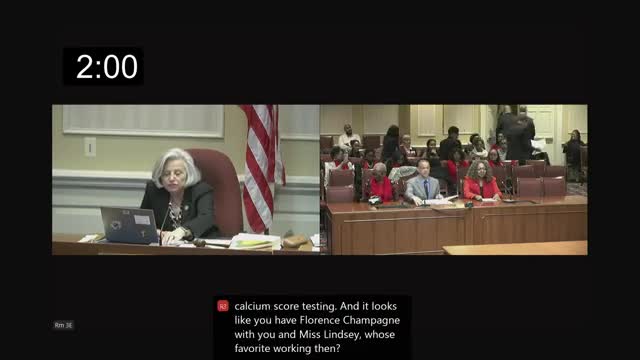Advocates push bill to require insurers and Medicaid to cover coronary calcium scoring for at‑risk patients
Get AI-powered insights, summaries, and transcripts
Subscribe
Summary
Senate Bill 60 would require Maryland Medical Assistance and private carriers to cover coronary artery calcium (CAC) screening for people meeting specific risk criteria; the Department of Health supported the objective but recommended clinical-criteria amendments to align with evidence-based practice.
Senate Bill 60 drew testimony Jan. 28 supporting insurer coverage of coronary artery calcium (CAC) scoring for people with specific cardiovascular risk factors. Sponsor Sen. Malcolm Augustine said the test — typically under $200 and taking minutes to perform — helps detect subclinical plaque and guide preventive care.
Patients and advocates described missed diagnoses and delayed care when CAC was not available. Florence Champagne, founder of the Open My Heart Foundation and a heart‑attack survivor, said she was misdiagnosed before an undetected major blockage required emergency surgery and urged coverage for early testing. “I did not receive the proper diagnostic test due to my lack of insurance coverage,” Champagne testified.
The Maryland Department of Health signaled support for the bill’s objective but asked that the clinical criteria be aligned with current evidence-based guidelines. Dr. Jenji Lindsey, MDH chief medical officer, told the committee that CAC is clinically useful for guiding treatment in people at borderline or intermediate risk and the department requested amendments so coverage criteria match best practices.
Cardiology experts including Dr. Paul Underwood of the Association of Black Cardiologists supported coverage as a low‑cost, high‑value prevention tool and said CAC can both identify people who need earlier preventive treatment and avoid overtreatment for those without plaque.
Ending: The department and sponsors indicated they would work on technical language to match clinical guidelines; advocates urged a favorable report to expand equitable access to prevention tools.
